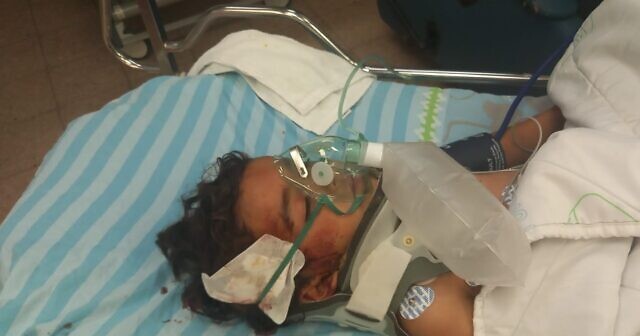Dozens of masked Israeli settlers hurled stones at Palestinians in the South Hebron Hills in the occupied territories on Tuesday afternoon, September 28, damaging cars and injuring at least 12 Palestinians, including a three-year-old boy, Palestinian and Israeli witnesses said. Some 16 Palestinian cars were damaged by the settlers’ stone-throwing, including one that flipped over on its side. Palestinian homes were also damaged by the missiles, including a water tank that was punctured, according to reports in Palestinian media and Zo Haderech.

Bakr Hussein Mohammad, aged 3, was injured by stones thrown by Israeli settlers while napping in his family’s home the South Hebron Hills, Tuesday, September 28. (Photo: Zo Haderech)
In videos from the scene, Israeli settlers can be seen smashing the windows of a Palestinian car and hurling stones at homes in the small Palestinian shepherding camp of Al-Mufaqara, a cluster of residences that straddles two illegal Israeli West Bank settlements, Avigayil and Havat Maon.
Palestinian witnesses said the Israeli military fired tear gas and stun grenades not at the rioting settlers but rather at them. Two elderly men aged 62 and 75 were detained by the Israeli army during the attacks. The injured 3-year-old child, Mohammad Bakr Hussein, was struck in the head by a rock hurled by an Israeli settler as he napped in his family’s home. The little boy was evacuated to the Soroka Medical Center in Beersheba in moderate condition, a hospital spokesperson said.
Integrated Settler-State Terror against Palestinians
Assault and vandalism by settlers against either Palestinians or Israeli security forces in the West Bank are commonly referred to as “price tag” attacks. Perpetrators say that they come in retaliation for Palestinian violence or government policies seen as hostile to the settler movement. Tuesday’s incident sparked condemnation by Hadash parliamentarians. “The lords of the land, backed by the occupation army and with the support of the occupation government, carry out daily terrorism against Palestinian residents,” wrote Joint List MK Aida Touma-Sliman on Twitter.
B’Tselem – The Israeli Information Center for Human Rights in the Occupied Territories – notes that the Israeli military itself repeatedly blocks roads and destroys water supply infrastructure in this area, as part of the authorities’ routine harassment of Palestinian communities in the South Hebron Hills, particularly in Masafer Yatta, in its bid to expel them from their homes and from the area in which they reside.
Saturday: Repeat Water March to South Hebron Hills
Following an earlier attempt two weeks ago to provide water access to communities in the South Hebron Hills, one met by unwarranted violence toward activists and Palestinians by occupation soldiers, tomorrow (Saturday, October 2) Israeli and Palestinians peace activists will return there to continue the struggle for water access. The event is being organized by the Palestinian residents of the area together with Combatants for Peace, Breaking the Silence, Standing Together, Peace Now, Mothers against Violence, All That’s Left as well as activists from Hadash.
While illegal Israeli settlements and outposts in the West Bank enjoy full access to civilian infrastructure, including drinking water in every home, the occupation does not allow running water to be supplied to thousands of Palestinian homes across the West Bank. Consequently, while daily water consumption per capita in Israel and the settlements is about 300 liters, for Palestinians in the occupied West Bank it is only about 70 liters per day, less than one quarter of the former.
In addition, for decades Israel has been taking over natural springs used for generations by Palestinians, defines them as nature reserves or military firing zones, and thereby prevents Palestinians from accessing them. Even natural cisterns that exist in these areas are sometimes classified by Israel as prohibited – and in many cases, the state destroys or blocks them up.
As a result, thousands of Palestinians are forced to transport water to their villages in trucks and tankers, while living nearby to settlements with equipped with swimming pools. Those transporting water often encounter harassment from the army and violent settlers.
“This Saturday, we will gather once again in the South Hebron Hills for a water march to ensure that a water tank reaches the home of the Hamamda family, Palestinians who have been denied the free access to water by Israel,” Combatants for Peace said in a statement released towards the event.
Transportation details (in English) to the Water March: https://forms.gle/ZJbD2UZtgy7ByWrZA.


